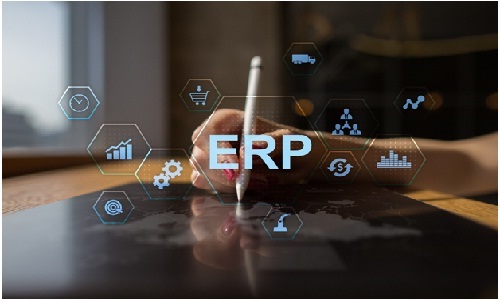
ERP systems are crucial in streamlining processes, enhancing efficiency, and driving growth. As technology advances at an unprecedented pace, businesses must stay up-to-date on the latest ERP landscape trends to remain competitive and maximize their operational potential.
In this blog post, we will explore the top trends in ERP that you should be aware of to harness the full potential of your ERP solutions. From the emergence of cloud-based ERP systems and the growing influence of artificial intelligence (AI) and machine learning (ML) to the importance of data security and the rise of industry-specific solutions, we will delve into the key developments revolutionizing the ERP space.
Cloud-Based ERP Systems:
One of the prominent trends revolutionizing the ERP landscape is the widespread adoption of cloud-based ERP systems. Traditionally, ERP systems were implemented on-premises, requiring substantial hardware, infrastructure, and maintenance investments. However, cloud ERP solutions have emerged as a game-changer, offering flexibility, scalability, and accessibility without requiring extensive infrastructure. Cloud-based ERP systems like Oracle ERP Cloud services enable businesses to leverage the power of the internet to access their systems from anywhere, anytime, facilitating remote work, global collaboration, and real-time data synchronization. Furthermore, cloud-based ERP systems often provide automatic updates, reducing the burden of software maintenance and ensuring businesses stay up-to-date with the latest features and security patches.
Integration of AI & ML:
AI & ML technologies are transforming the ERP landscape, empowering businesses to make data-driven decisions and automate routine processes. AI-driven ERP systems can analyze vast amounts of data, extract valuable insights, and provide predictive analytics for more accurate forecasting and planning. ML algorithms enable ERP systems to learn from historical data, optimize inventory management, and enhance demand forecasting. By integrating AI and ML into ERP solutions such as Oracle ERP Cloud services, businesses can transform operations, improve efficiency, and gain a competitive edge in today’s data-driven business environment.
Focus on Data Security:
Data security becomes critical as businesses increasingly rely on ERP systems to manage sensitive data. Increased cyber threats and regulations like the General Data Protection Regulation (GDPR) necessitate robust security measures within ERP systems. To safeguard their data, businesses should seek encryption, multi-factor authentication, and role-based access control in their ERP solutions. Regular security audits and proactive monitoring should also be implemented to identify and mitigate potential vulnerabilities. By prioritizing data security within ERP systems, businesses can protect valuable assets, build trust with customers, and ensure compliance with regulatory requirements.
Industry-Specific Solutions:
ERP systems have evolved from generic solutions to industry-specific solutions tailored to meet the unique requirements of different sectors. Industry-specific ERP solutions offer specialized functionalities and modules designed to address particular industries’ specific challenges and workflows. Whether manufacturing, healthcare, retail, or construction, industry-specific ERP solutions provide businesses with pre-configured modules, compliance features, and best practices relevant to their sector. Businesses can optimize their operations, improve productivity, and gain an advantage in their respective markets by choosing an ERP such as Oracle ERP Cloud services specifically designed for their industry.
Enhanced User Experience:
User experience (UX) has become a focal point in modern ERP systems. In the past, ERP interfaces were often complex and difficult to navigate, resulting in reduced user adoption and productivity. However, the trend toward intuitive and user-friendly ERP interfaces has gained momentum. ERP vendors like Oracle ERP Cloud Services Providers invest in creating visually appealing, easy-to-use interfaces that provide a seamless experience across different devices. Mobile accessibility is also a key consideration, allowing users to access critical data and perform essential tasks. By prioritizing UX design in ERP systems, businesses can enhance user adoption, increase productivity, and improve overall satisfaction with the software.
The Impact on ERP System Implementation:
These trends significantly impact the ERP system implementation process. Cloud-based ERP systems such as Oracle ERP Cloud services simplify implementation and provide flexibility while integrating AI and ML technologies requires specialized expertise. Data security considerations demand robust security measures, and industry-specific solutions streamline customization efforts. Lastly, prioritizing user experience enhances user adoption and satisfaction. Understanding these trends helps implementation teams navigate the complexities and challenges associated with ERP system implementation, resulting in successful deployments and improved business outcomes.
Conclusion:
In conclusion, staying informed about the top trends in ERP is vital for businesses seeking to optimize their operations and remain competitive in the evolving business landscape. Cloud-based ERP systems offer flexibility, scalability, and accessibility, enabling organizations toadapt to changing business requirements. Integrating AI and ML brings data-driven decision-making and process automation to ERP, enhancing efficiency and accuracy. Data security remains a pressing concern, necessitating robust measures to protect sensitive information. Industry-specific ERP systems such as Oracle ERP Cloud solutions provide tailored functionalities and best practices, catering to the unique needs of different sectors. Finally, focusing on user experience ensures that ERP systems are intuitive, easy to use, and accessible across multiple devices.
By embracing these trends and harnessing the power of ERP systems such as Oracle Fusion Cloud ERP, businesses can transform their operations, drive growth, and gain a competitive edge in today’s fast-evolving business environment. Organizations must understand these trends, evaluate their requirements, and choose ERP solutions aligning with their goals and objectives. As technology continues to evolve, businesses that adapt and leverage the latest trends in ERP will position themselves for success in the future.

Be the first to comment